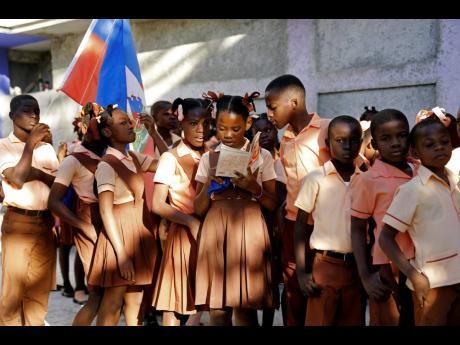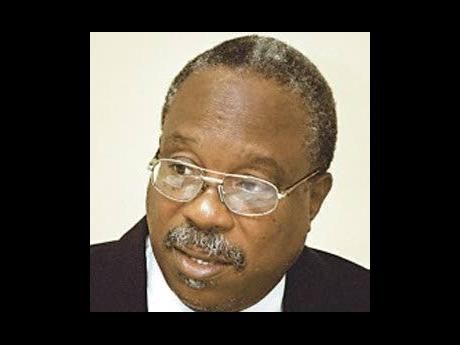Dennis Minott | Assisting Haiti to retrieve its future
... from malevolent shadows eclipsing the sun
In Haiti’s heart, a heavy sigh,
Where gunshots pierce the morning sky.
Innocent lives, a fleeting breath,
Lost in a rainless storm bringing death.
And even sadder, children stand,
Books unopened, dreams in sand.
Empty classrooms, futures dim,
The weight of absence crushing them.
For when the schoolhouse doors are shut,
Generations stumble in a silent rut.
No whispered knowledge, skills untaught,
A cycle trapped, a bitter draught.
But hope still flickers, though it’s frail,
In whispered stories, courage’s tale.
Haitian spirit, strong and bold,
Will rise above, a story told.
The heartbreaking report on Haiti is the “bank-to-bank” reality of violence against innocent people, yesterday, today and in the days to come. Equally distressing is the fact that numerous promising Haitian children won’t be able to attend school tomorrow or in the foreseeable future. This casts a shadow of sadness over Haiti’s prospects, potentially dimming its future for generations to come. Beyond the $333 million aid from the US for policing, soldiering, and threatening to shoot which will often manifest in English-speaking boots ready to resort to violence against black and not-so-black people, what additional support can be extended like Jamaica, CARICOM, and even Kenya?
In addressing this exigent situation, it’s imperative to devise affordable and sustainable strategies to aid the 11.5 million CARICOM citizens in Haiti towards a swifter recovery and a brighter future. While the dire issues are complex, it’s essential that we plot a route through it with the collective well-being of CARICOM nations in mind, particularly Jamaica, as Haiti’s close neighbour.
BEGIN WITH PILOT PROJECT
Jamaica stands as a beacon of arguably good education in the region with 970 six-year primary schools, 180 seven-year secondary schools, and several (at least 12) teacher- training institutions including UWI, UTech, and The Mico University College, all situated in the Corporate Area. Additionally, Northern Caribbean University is based in Mandeville.
Within CARICOM, there are approximately 30 tertiary institutions offering teacher-training programmes.
A plausible and cost-effective strategy could involve Jamaica, even if alone, offering scholarships for primary, secondary, and teacher-training education to Haitian students. Beginning in September, Jamaica could provide scholarships for two Haitian pupils per grade-level at each of its primary schools for a period of six years, totalling 11,640 ... (2x6x970) ... complete primary school educations taught in English.
Similarly, scholarships could be extended for two Haitian students per grade-level at each secondary school for a period of seven years, resulting in 2,520 complete secondary school educations taught in English. “Champs In Kingston at Stadium” and all!
Further, Jamaica could offer scholarships for teacher-training education to two Haitian youths per tertiary year at each teachers’ college for a duration of four years, leading to the bestowal of 96 Jamaican teaching diplomas and BEds taught in English upon Haitian youths.
Collaboration with Guyanese and Surinamers, leveraging petro-dollars, could significantly aid in delivering this lifeline to Haiti’s youth. Efforts should be made to ensure that the education provided is environmentally green and sustainable, digitally inclined, and aligned with current and future job market demands.
By implementing such necessary albeit insufficient measures, we can provide tangible support to Haiti’s youth, fostering hope and opportunity amidst horrific adversity.
By outlining this proposal I am advocating for a transient educational rapid-support plan for Haiti. One for Jamaica, and CARICOM nations to aid Haiti’s recovery and brighten its future. Here is my preliminary analysis of the likely benefits and challenges of this fraternal South-South plan:
BENEFITS
Educational empowerment: Providing hope-laced revival scholarships for Haitian students in comparatively peaceful Jamaican schools can significantly enhance educational opportunities for Haitian youth, leading to improved literacy rates, compassion and skills development.
Cultural and educational exchange: Sharing Jamaica’s educational resources can foster cultural exchange, respect, and understanding between Haiti, Jamaica, CARICOM, and the wider world. Haiti’s acceptance of this opportunity can contribute significantly to lasting reproductive peace and regional unity.
Capacity building: Training Haitian teachers in Jamaican institutions can enhance the quality of education in Haiti, leading to a more skilled workforce and improved teaching standards.
Sustainable development: Emphasising green-friendly and digitally inclined education aligns with global trends towards sustainability and technological advancement, preparing Haitian youth for the current near- future global job market.
CHALLENGES
Resource allocation: Implementing such a large-scale scholarship program requires substantial financial resources and logistical support to ensure its effectiveness.
Language barrier: While English education can be beneficial, ensuring adequate language support for Haitian students who may not be proficient in English could be a challenge.
Sustainability: Long-term sustainability of the program needs to be considered to ensure that the benefits are enduring and contribute to Haiti’s lasting development in the wake of its Troubles.
Political support: Securing political backing from all involved nations is crucial to sustain the initiative and overcome potential obstacles.
Here’s, the thing, while the proposed educational support plan holds promise in uplifting Haiti’s education sector and fostering regional cooperation, careful planning, resource mobilization, diverse accommodation logistics, unflinching child protection at the most granular level, language considerations, and long-term commitment are essential to maximise its benefits and address potential challenges effectively.
I have this dream that all other CARICOM national jurisdictions will join Jamaica in implementing this plan with alacrity. Indeed, this ought to be a CARICOM Project starting with the new school year of 2024 to 2025.
We would like to hear what the key officials – Prime Minister Andrew Holness, Opposition leader Mark Golding, ministers Horace Chang, Fayval Williams, Olivia Grange, Kamina Johnson-Smith, Senator Damion Crawford, as well as academics Leighton Johnson, Linvern Wright, Hilary Beckles, and Kevin Brown – have to say ...
Dennis Minott, PhD, is the CEO of A-QuEST-FAIR. He is a multilingual green resources specialist, a research physicist, and a modest mathematician who worked in the oil and energy sector. Send feedback to: a_quest57@yahoo.com or columns@gleanerjm.com.


